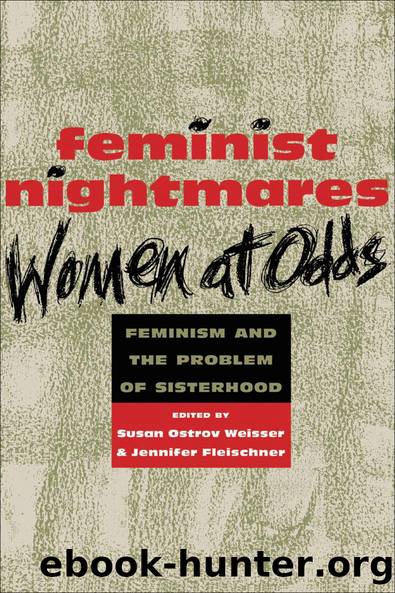Feminist Nightmares: Women At Odds by Susan Ostrov Weisser

Author:Susan Ostrov Weisser [Weisser, Susan Ostrov]
Language: eng
Format: epub
ISBN: 9780814726204
Barnesnoble:
Publisher: New York University Press
Published: 1994-10-01T00:00:00+00:00
CONCLUSIONS
The two films I discussed were both made shortly after the Mary Beth Whitehead case in direct relation to it. I offer them as diverse examples of how the Whitehead case was used to make imaginary productions, and how it figured in different kinds of imaginations, different fiction making processes. Interesting are the different meanings the different textual strategies produce: the Rosier video is in part a direct critique of the television Whitehead film and included its footage to makes its points. While the miniseries does not draw attention to values of any kind, it is clear that discourses about class, race, and âfamily values,â ongoing in U.S. culture, structure how surrogate mothering is conceptualized. The unavoidable genre of melodrama that constructs the Baby M commercial production, in turn, governs how the two women are categorized and the type of drama that is shown. Meanwhile, Martha Roslerâs deliberately provocative, didactic video on the miniseries and other media treatment of the case, made from a classical Marxist perspective, partly critiques dominant media treatment of the case, by focusing on representations of Mary Beth versus the Sterns from a theory of working class versus bourgeois relations. It also critiques the medical establishment in ways now quite predictable in some feminist quarters. Simple antimedicine perspectives too easily degenerate into antitechnology stances that assume there is an unmediated ânature,â that âbiologyâ is discursively neutral. The antimelodrama narrative is, then, still constituted by melodrama forms.
It is easy to see how close some of the womenâs positive and negative narratives, explored earlier on, are to genres like melodrama, or to the soaps Gordon mentions. Indeed, the traditions of the melodrama genre may construct or shape the form that womenâs stories take in the first place, including sisterliness becoming unsisterly: women at odds. What is important for my purposes is how the melodrama form oversimplifies the actual psychological, political, social, and economic contexts of surrogacy. I have argued that the prevalence of the melodrama form in womenâs lives itself conditions the modes through which women think their lives. Women need to find forms more subtleâones that enable multiple perspectives, ambiguities, contradictions, the yes/but, and the no/and/yes possibilities that are crucial as feminisms enter the nineties and attempt to grapple with difference on new levels.
Download
This site does not store any files on its server. We only index and link to content provided by other sites. Please contact the content providers to delete copyright contents if any and email us, we'll remove relevant links or contents immediately.
Come as You Are by Emily Nagoski(3978)
The Evolution of Beauty by Richard O. Prum(2553)
The Happy Hooker by Xaviera Hollander(2274)
The Clitoral Truth: The Secret World at Your Fingertips by Rebecca Chalker(2243)
The Psychology of Human Sexuality by Lehmiller Justin J(2198)
The Book of Questions: Revised and Updated by Gregory Stock Ph.d(2139)
Women on Top by Nancy Friday(2122)
The Modern Alpha Male: Authentic Principles to Become the Man You Were Born to Be: Attract Women, Win Friends, Increase Confidence, Gain Charisma, Master Leadership, and Dominate Life - Dating Advice by Patrick King(1833)
The Coregasm Workout by Debby Herbenick(1819)
The Ultimate Guide to Anal Sex for Women by Tristan Taormino(1753)
She-ology by Sherry A. Ross MD(1698)
101 Nights of Great Sex by Laura Corn(1692)
The Hite Report on Shere Hite by Shere Hite(1664)
Orgasm mini book by Susan Bakos(1538)
A Round-Heeled Woman by Jane Juska(1525)
The Ultimate Guide to Fellatio by Violet Blue(1524)
The Alchemy of Sexual Energy by Mantak Chia(1490)
The Penis Book by Aaron Spitz(1442)
The Sexual Ecstasy Workbook by Margot Anand(1286)
